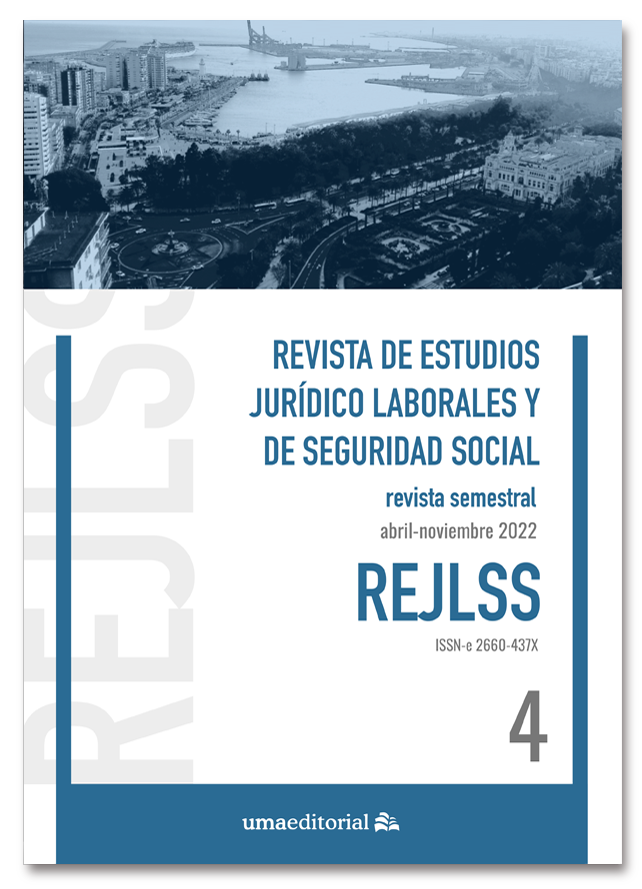The Forced Retirement of Air Traffic Controllers
Comments to the STS of November 25, 2020
DOI:
https://doi.org/10.24310/rejlss.vi4.12294Keywords:
Air traffic controllers, forced retirement, age discrimination, constitutionality, dismissal, ineptitudeAbstract
The age of forced retirement of the group of air traffic controllers at 65 years, provided for by disp. add. 4th Law 9/2010, which regulates the provision of air traffic services, is not discriminatory, being justified by the purpose of avoiding negative consequences that may arise from the impact that factors such as the high level of stress, shift rotation and extreme responsibility for air operations.
Downloads
Metrics
Publication Facts
Reviewer profiles N/A
Author statements
Indexed in
-
—
- Academic society
- N/A
- Publisher
- Universidad de Málaga. UMA Editorial
References
Álvarez Cortes, J.C., “Extinción del contrato de trabajo por el cumplimiento de la edad legal de jubilación (DF. 1ª)”, en AA.VV., Las reformas laborales y de Seguridad Social para 2019: estudio sistemático del RD-Ley 28/2018, de 28 de diciembre, para la revalorización de las pensiones y otras medidas urgentes en materia social, laboral y de empleo y normas concordantes, Laborum, Murcia, 2019.
Charo Baena, P. y Guerrero Jarreño, R., “La jubilación forzosa y la gestión de la diversidad generacional en la empresa: ¿dos conceptos antagónicos?, en AA.VV., Por una pensión de jubilación adecuada, segura y sostenible. IV Congreso Nacional de la Asociación Española de Salud y Seguridad Social, Laborum, 2019.
Monereo Pérez, J.L. y Ortega Lozano, P.G., “La discriminación por razón de edad vinculada al momento de la jubilación del trabajador: la objetividad, la razonabilidad y el juicio de proporcionalidad”, La Ley Unión Europea, núm. 58, 2018.
Monereo Pérez, J.L., y Rodríguez Iniesta, G., “Repensar críticamente el modelo de regulación de la pensión de jubilación”, en AA.VV., Por una pensión de jubilación adecuada, segura y sostenible. IV Congreso Nacional de la Asociación Española de Salud y Seguridad Social, Laborum, Murcia, 2019.
Muros Polo, A., “La paradoja de la jubilación forzosa y el envejecimiento activo”, Revista de Derecho de la Seguridad Social (Laborum), núm. 26, 2021.
Rodríguez-Piñero y Bravo Ferrer, M., “Discriminación por razón de edad y jubilación forzosa en convenio colectivo”, Relaciones Laborales, núm. 13, 2008.
Downloads
Published
How to Cite
Issue
Section
License
In the Revista de Estudios Juridico Laborales y de Seguridad Social (REJLSS) we are clearly committed to a policy of open access to scientific knowledge (See Berlin Declaration).
Those authors who have publications with this journal accept the following terms:
This journal provides immediate free access to its content under the principle of making research freely available to the public. All the contents published in the REJLSS are subject to the Creative Commons license
Attribution-NonCommercial-NoDerivatives 4.0 International (CC BY-NC-ND 4.0)
Copyrights are of two kinds: moral and patrimonial. Moral rights are perpetual, inalienable, non-transferable, inalienable, unattachable and imprescriptible prerogatives. In accordance with Spanish copyright legislation, the authors who publish in REJLSS retain the moral right over their work, as well as the ownership of the patrimonial right, which will be transferred to the University of Malaga for its dissemination in open access.
The patrimonial rights, refer to the benefits that are obtained by the use or disclosure of the works. REJLSS is published in open access and is exclusively authorized to perform or authorize by any means the use, distribution, dissemination, reproduction, adaptation, translation or transformation of the work.
It is the responsibility of the authors to obtain the necessary permissions of the images that are subject to copyright.
Authors whose contributions are accepted for publication in this journal retain the non-exclusive right to use their contributions for academic, research and educational purposes, including self-archiving or depositing in open access repositories of any kind.
The electronic edition of this magazine is edited by the Editorial of the University of Malaga (UmaEditorial), being necessary to cite the origin in any partial or total reproduction.
The authors may adopt other non-exclusive license agreements for the distribution of the version of the published work (eg: deposit it in an institutional telematic archive or publish it in a monographic volume) provided that the initial publication is indicated in this magazine.
Authors are allowed and recommended to disseminate their work through the Internet (eg, in institutional telematic archives or on their website) before and during the submission process, which can produce interesting exchanges and increase citations of the published work.







19.png)
